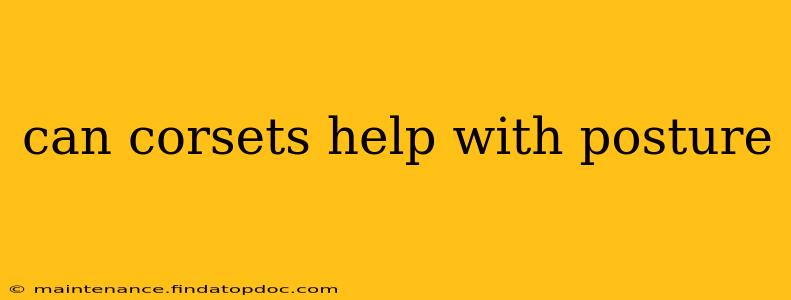Can Corsets Help with Posture? Unraveling the Truth Behind the Tightlacing
The question of whether corsets can improve posture is complex, sparking much debate among medical professionals and fashion enthusiasts alike. While corsets can temporarily improve posture by providing external support, their long-term effects and overall suitability are nuanced and depend heavily on factors like design, usage, and individual needs. Let's delve into the details.
Do corsets help with posture in the short term?
Yes, corsets can provide immediate postural support. By cinching the waist and providing structured support for the torso, they can pull the shoulders back and encourage a more upright posture. This is particularly noticeable for individuals with mild slouching or poor posture habits. Think of it like wearing a back brace—it provides external support, holding the body in a more aligned position. This immediate effect is why some people find corsets helpful for special occasions or when they need to maintain good posture for extended periods.
What are the long-term effects of wearing a corset on posture?
The long-term effects of corset use on posture are far less clear-cut and potentially problematic. While the external support can temporarily correct posture, prolonged use might weaken the core muscles responsible for maintaining posture naturally. This is because the corset does the work for these muscles, potentially leading to muscle atrophy and a dependence on the external support. Once the corset is removed, the individual may find their posture has not improved or even worsened due to weakened core muscles.
Can corsets damage your posture?
While not inherently damaging, improper corset use can indeed negatively impact posture. Tight lacing, particularly with ill-fitting or poorly designed corsets, can compress the ribcage and restrict breathing, leading to poor posture and even health problems. This can result in a forward head posture, rounded shoulders, and an overall less balanced body alignment. Furthermore, constant pressure on the spine can lead to discomfort and potential long-term issues.
Are there any health risks associated with wearing a corset?
Yes, several health risks are associated with wearing corsets, especially those that are excessively tight or worn for prolonged periods. These risks include:
- Rib cage compression: This can restrict breathing and negatively impact lung capacity.
- Organ displacement: Excessive tightening can displace internal organs, potentially leading to discomfort and digestive issues.
- Muscle weakness: As mentioned above, reliance on the corset can lead to core muscle weakness.
- Back pain: Improper use can exacerbate existing back pain or contribute to new problems.
- Nerve damage: Tight lacing can compress nerves, causing pain, tingling, or numbness.
What type of corset is best for posture?
If you're considering using a corset for posture support, it's crucial to choose wisely. A well-made corset designed for posture correction, rather than extreme waist reduction, is essential. These corsets often feature a sturdy structure with built-in back support and are designed to be worn comfortably without excessive tightness. Consult a physical therapist or medical professional to determine if a corset is appropriate for your situation and for guidance on proper fit and usage.
Are there alternatives to corsets for improving posture?
Numerous alternatives exist for improving posture without the potential risks associated with corsets. These include:
- Physical therapy: A physical therapist can identify postural issues and create a tailored exercise program to strengthen core muscles and improve posture.
- Posture exercises: Simple exercises like shoulder blade squeezes, chin tucks, and stretches can significantly improve posture.
- Posture correcting devices: These devices, such as posture braces, offer less restrictive support than corsets.
- Ergonomic adjustments: Making changes to your work environment, such as adjusting your chair and desk height, can improve posture.
In conclusion: While corsets can offer temporary postural support, their long-term effects are debatable and potentially harmful. Focusing on strengthening core muscles through exercise and adopting good posture habits is a safer and more effective approach to long-term posture improvement. If you're considering using a corset, consult a medical professional first to assess its suitability for your individual needs and to minimize potential risks.
